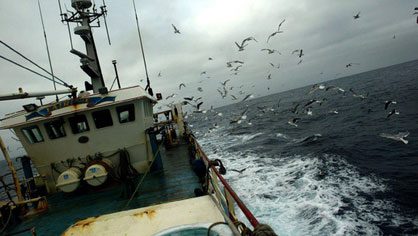News
3 January 2013
The Federation faces a busy year ahead. It is always difficult to quickly summarise all the NFFO's activities but the list below (in no particular order of priority) provides a flavour of our main areas of work.
- Round 3 of the EU/Norway talks, deferred from the end of 2012. We will continue to press for a rollover TAC for North Sea cod
- In January, the NFFO is co-hosting a workshop on different kinds of fully documented fisheries with CEFAS scientists and skippers; fisheries which provide comprehensive catch data tend to operate under a less restrictive regime
- Early in the New Year a meeting of the Federation’s Shellfish Committee will be held to progress work on shellfish policy; striking the right balance in dealing with latent capacity is a central issue
- Developing a fresh and equitable approaches to quota pinch-points in the under-10 metre sector will remain a priority in 2013
- The Federation’s heavy involvement with RACs will continue, starting in January with a prominent role in the annual meeting between the RACs and senior figures from ICES, with a major focus on data limited stocks
- Continuing work on the adoption if a revised EU Cod Management Plan, with a focus on fast-tracking new legislation through the European Parliament and the co-decision procedure
- Vigorous opposition to the Government’s decision to close down the small-scale salmon net fishery in the North East
- A meeting with the Welsh First Minister to resist discriminatory measures against Commercial fishing vessels in the Bristol Channel
- A leading role in the MPA Fishing Coalition to ensure fair treatment for fishermen in the establishment of a network of marine protected areas in UK waters; MPAC has successfully held Government and its statutory conservation advisors to account on evidence used to designate MPAs, the quality of stakeholder involvement, unrealistic timetables and crucially, the issue of displacement of fishing vessels from their customary fishing grounds
- Against the background of the concordat signed last year between DEFRA and the devolved administrations, pressing to ensure no loss of overall coherence in UK fishing policy and for equitable treatment of the constituent parts of the UK fleet
- Continuing work on key aspects of the CFP reform, beginning with a meeting with the DEFRA Fisheries Director in January
- Working towards an audit of the Irish Sea cod fishery as the basis of a new focused approach
- Continued work with the Crown Estate and individual developers to mitigate the impact of offshore wind-farms; the NFFO/Crown Estate groundbreaking collaborative work on precision mapping of fishing activities using skippers’ own plotter data provides the basis for a useful dialogue about the location of wind-farms
- Continued work with Subsea Cables UK on the burial of submarine cables
- Work within the RACs on the development of long term management plans for key stocks, with the immediate focus on North Sea Nephrops and the Celtic Sea demersal fisheries
- Participation in ICES benchmark meetings at which the assessment for particular sticks are subject to rigorous scrutiny
- Pressing for a fairer and industry -friendly approach to the mandatory introduction of satellite monitoring and electronic logbooks; use scope of available EU exemptions to allow time for teething problems to be resolved; opposition to the government policy of only permitting a single monopoly supplier
- Defending the fishing industry’s reputation from unwarranted and sensationalist media attacks
- Maintaining a high priority for fishing vessel safety and training
- Through the NFFO Training Trust, distributing around £100,000 to fishermen for training and the purchase of safety equipment throughout the year
- We aim to distribute one thousand low cost life jackets which have been bulk purchase and grant assisted (EFF, Seafish and NFFO) for use on member vessels
- A number of NFFO regional committee meetings will be held throughout the year to sound out grass-roots opinion in the ports on key local, national and European issues early in the New Year
- Our work on next year’s TACs and quotas will begin early in the New Year
- Continued support for a satisfactory outcome in the dispute with Iceland and Faeroes on the international mackerel issue
- Work on the Seafish sector panels to ensure that Seafish levy is spent in ways useful for the catching sector and the supply chain generally
- Working with appropriately qualified scientists towards a deep sea regime based on evidence and targeted measures rather than a blanket approach driven by a misplaced, counterproductive and politically inspired agenda
- Working within the framework of the Fisheries Science Partnership to fill information gaps that are important for specific fisheries
- Continuing to participate in relevant STECF meetings where the fishing industry perspective is required
- Engagement with the Marine Management Organisation across a range of issues relating to how fisheries policy is delivered
Doubtless, new areas of work will arise during the year. Our Executive Committee meets roughly every six weeks to ensure that the policy approaches pursued by the Federation are in tune with grass roots opinion and the issues that require attention are raised.

